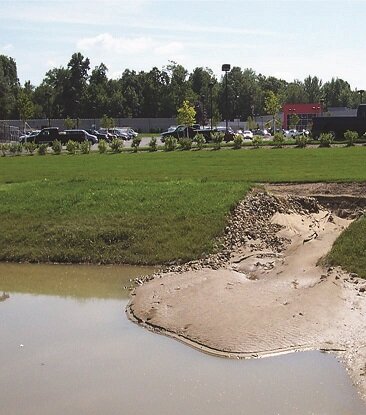Why is Soil Erosion and Sedimentation Control important?
Sediment is the greatest pollutant by volume impacting our lakes, streams and wetlands. Sediment is the product of uncontrolled erosion. Everyone in Michigan is affected by erosion and off-site sedimentation. Erosion and sedimentation result in: loss of fertile topsoil, filling of lakes and streams, increased flooding, damage to plant and animal life and structural damage to buildings and roads. Without the proper SESC site planning and best management practices, the earth disturbance associated with construction can be a of the major cause of erosion and sedimentation in Michigan. Over 100 tons of sediment per acre per year can be generated on some construction sites.
Safety Reasons
Eroded soils can enter water bodies and channels, raising water levels and clogging culverts. This can increase the chances for inundation of surrounding land.
Sediment can get deposited onto streets and roads by vehicles leaving the site or by stormwater runoff. When wet, these sediments can be dangerous for drivers and bicycle riders.
Other pollutants such as pesticides, herbicides, and oil can become attached to eroded soils and enter water bodies along with the soil. These contaminants can make swimming unhealthy for children and adults.
Environmental Reasons
Sediment in water bodies can cover eggs of fish and other organisms, preventing them from reproducing.
Excess sediment that is suspended in streams and rivers acts like sandpaper on fish and other organisms. Suspended sediment can also abrade the tissues of plants that live in the water.
Sediment in water bodies can clog gills of fish and other organisms that have gills, making breathing difficult.
Sediment reduces light penetration making photosynthesis more difficult for water plants.
While blocking light penetration, the soil particles absorb the heat from sunlight and later release it, thereby raising the temperature of the water and driving off desirable fish populations.
Aesthetic & Recreational Reasons
Clear water is more desirable for swimming, boating, canoeing and fishing than mud-filled water.
Excess sediments build up in lakes and rivers. This raises the water level but reduces water depth, which decreases canoeing and fishing opportunities.
Economic Reasons
Sediment can negatively affect the equipment used in the drinking water treatment process. This increases the cost of treating drinking water.
County and Intercounty Drains need to have the sediment removed more frequently with the costs assessed to landowners and municipalities within drainage districts.


